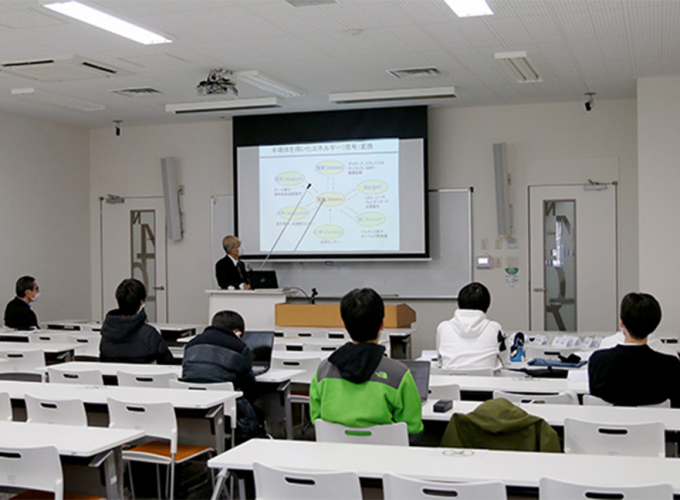Professor Hiroyuki Matsunami becomes the fourth Japanese researcher to receive the IEEE Edison Medal
Jan 17, 2023
GeneralThe Institute of Electrical and Electronics Engineers (IEEE), the world‘s largest professional association for electrical and electronic engineers, announced in December that the Edison Medal, one of their most prestigious honors, will be awarded to Specially Appointed Professor Hiroyuki Matsunami of the Nagamori Institute of Actuators.The Institute of Electrical and Electronics Engineers (IEEE), the world‘s largest professional association for electrical and electronic engineers, announced in December that the Edison Medal, one of their most prestigious honors, will be awarded to Specially Appointed Professor Hiroyuki Matsunami of the Nagamori Institute of Actuators.
Named after inventor Thomas Edison, the medal has been awarded annually since 1909 and is the oldest award in electrical and electronic engineering. Comparable in significance to the Nobel Prize, the award is presented to researchers in recognition of a career of meritorious achievement. According to the IEEE, the award was given to Professor Matsunami for his “pioneering contributions to the development of silicon carbide material and its applications to electronic power devices.“ Professor Matsunami is the fourth Japanese winner of the medal, joining Junichi Nishizawa (from Tohoku University) who received the award in 2000, Isamu Akasaki (Nobel Prize laureate from Meijo University) in 2011, and Kenichi Iga (from the Tokyo Institute of Technology) in 2021.
In response to this award Professor Matsunami said, “The grounds of Iwashimizu Hachimangu Shrine in Yawata City, where I moved to 43 years ago, are associated with Thomas Edison who perfected the incandescent light bulb. There is a monument engraved with the words ‘Genius is one percent inspiration, and ninety-nine percent perspiration.’ Looking back, my research life was a series of failures. However, I enjoyed continuing my research. I believe that the future was opened up by a mere 1% of inspiration. This time, I was awarded the prestigious award. I hope that researchers will not be afraid of failure and will continue to enjoy challenging things that no one else has done.”
Commenting on Professor Matsunami’s achievements the IEEE said that, ”Without Professor Matsunami, there would have been no current SiC boom.” The award ceremony will be held on the 5th of May 2023 in Atlanta, USA.

Professor Matsunami and Silicon Carbide SemiconductorsProfessor Matsunami and Silicon Carbide Semiconductors
Silicon carbide (SiC) semiconductors are attracting attention as a next-generation technology that can help realize “green” innovation by improving the efficiency of motor drivers and by reducing losses in solar and wind power generation systems. Semiconductor manufacturers around the world are investing heavily to build SiC factories and car manufacturers are rapidly adopting SiC semiconductors for their electric vehicles. Although SiC semiconductors were known to have excellent properties, they were extremely difficult to manufacture and so little research was done on them.
More than 50 years ago, at Kyoto University, Professor Matsunami took up the challenge of researching SiC semiconductors. In 1987, after 20 years of work, he invented a step-controlled epitaxial growth method that produces high-quality SiC crystals in which carbon atoms and silicon atoms are arranged in the same pattern. Using this high-quality SiC crystal he prototyped a power semiconductor device with surprising performance far surpassing that of conventional semiconductors (having higher insulation voltage characteristics and converter losses about one hundred times lower than that of contemporary silicon devices). It was a breakthrough that paved the way for a new generation of power electronics technologies using SiC semiconductors, which had previously been thought impractical. Research on SiC soon began all around the world and Professor Matsunami launched an international conference for SiC researchers to help guide global SiC semiconductor research. Since retiring as professor at Kyoto University he has broadened his scope of activities beyond academia to the industrial world.
As the director of the Japan Science and Technology Agency (JST) Innovation Plaza Kyoto he cooperated with government officials and companies to develop a competitive SiC industry in Japan through government-academia-industry collaborations. As chairman of the SiC Alliance he continues to support companies and research institutes, as well as helping to promote national projects as a member of the NEDO Next Generation Power Electronics Program Promotion Committee. He teaches semiconductor technology, including SiC, by sharing his own experiences. His students have the rare experience of receiving guidance on “principles of semiconductors” and “technical innovation” directly from a world-renowned authority in semiconductor research.
For his outstanding achievements and contributions Professor Matsunami has been presented with several other significant awards, both domestically and internationally, including the Asahi Prize in 2013 and the Honda Prize in 2017.
(Shinichi Domae, Nagamori Actuator Research Institute)